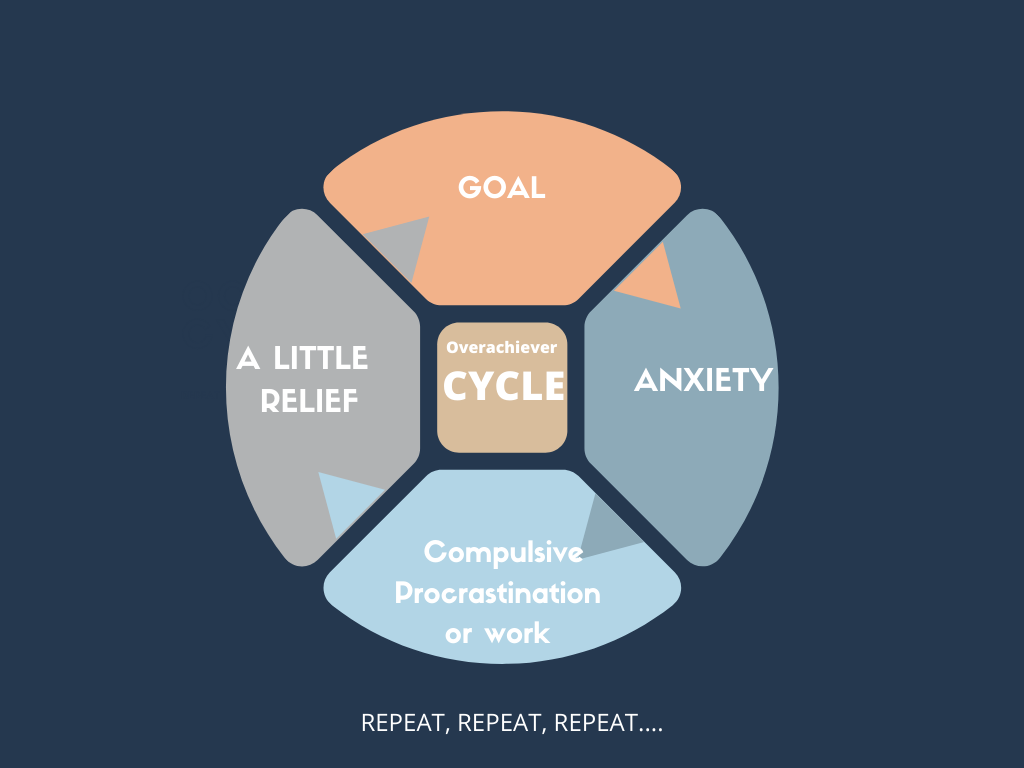How is Your Sleep?
During my first session with a client (also known as “the intake session”) I always ask no matter what the mental health issue—
5 min read
KD HOLMES, LPC, EMDR CERTIFIED, BTTI TRAINED
:
Oct 29, 2023 2:21:46 PM

One of the fundamental pillars of my therapeutic approach focuses on adults who find themselves entangled in the intricate web of anxiety and depression, all stemming from their unwavering quest for perfection through overachieving.
An Overachiever can be best described as an individual who constantly strives for continuous improvement and perfection in everything they do. I mean everything, including achieving success...what else would we want? And we do it with 100 percent certainty. We have an unwavering expectation of flawlessness, leaving no room for any perceived failure. Although our loved ones may see us as successful, internally we place immense pressure on ourselves to meet a rigid standard that we feel obligated to uphold.
Our pursuit of perfection is relentless, always aiming for superior results. While this often involves excessive effort, it can also be achieved effortlessly through our innate ability to maintain perfection.
The inner world of overachievers is fraught with anxiety and depression, stemming from our relentless pursuit of perfection. We subject ourselves to negative self-talk when our perceived standards are not met, constantly striving to get assignments and work "just right." We find ourselves caught in a cycle of checking, rechecking, and doing everything perfectly, rigidly adhering to our insane work habits. Procrastination can become a coping mechanism rooted in their unyielding pursuit of perfectionism. These internal standards take a toll on our sense of self, contributing to symptoms of depression and anxiety.
You can't have overachieving without perfectionism. So what is perfectionism? Perfectionism is a value and a desire for excellence, but an insatiable need for flawlessness in every aspect of life. It is the relentless pursuit of an unattainable standard, where any perceived imperfection is met with harsh self-criticism and dissatisfaction. Perfectionism dictates that everything must be done perfectly, from work assignments to personal relationships, leaving no room for mistakes or failures. It is a constant pressure to meet unrealistic expectations, leading to a cycle of anxiety, stress, and dissatisfaction.
Perfectionism is the driving force behind overachieving behavior, as individuals strive to meet their own impossible standards. It fuels the need for constant improvement and success, pushing individuals to go above and beyond in their pursuits. However, this unyielding quest for perfection can also be a double-edged sword, leading to feelings of inadequacy, anxiety, and depression when expectations are not met even a little a bit.
In essence, perfectionism is the driving force that propels overachievers to push themselves to the limit, always striving for excellence in everything they do. It is a mindset that demands nothing less than perfection, creating a constant state of stress and pressure to meet unattainable standards.
The next component of overachieving is compulsive behavior patterns, which often manifest in various ways in our daily lives. These behaviors stem from our deep-rooted need for perfection and success, driving us to engage in repetitive actions or rituals to alleviate the anxiety and pressure we feel.
In the world of overachievers, these compulsive behaviors can take a toll on our mental health and well-being, leading to increased stress, anxiety, and even depressive episodes. We may find ourselves trapped in a cycle of never feeling satisfied with our accomplishments, always striving for more and never allowing ourselves to rest or be content with where we are. This constant need for perfection and achievement can be exhausting and overwhelming, leaving us feeling trapped by our own high standards.
Breaking free from these compulsive behavior patterns is essential for our mental health and overall well-being. Through therapy and self-reflection, we can begin to unravel the root causes of these behaviors and learn healthier ways to cope with the pressures of overachieving. By challenging our perfectionistic tendencies and learning to embrace imperfection, we can start to find a sense of peace and fulfillment that doesn't rely solely on external achievements. If the thought of embracing imperfection made you cringe, you are in the right place.
Outside of the realm of overachievers, family members often think, just stop, (if only it were that easy). This type of person cannot stop, in fact, I would consider their behavior within the compulsive range based on the lack of understanding of how little control they have over their nearly impossible expectations and procrastination.
This results in the perfect storm of personality traits of being goal-driven, successful at achieving, along with the external feedback of achieving that keeps us in this loop. The danger here is that we are only free of anxiety if we hit the mark perfectly. That relief is short lived because it is followed by achieving the next goal.
Otherwise we are not free to leave for the day, go to sleep, or know that what we did is enough. This loop can lead to avoiding school when assignments are due, not sleeping, or extreme depressive episodes.
Often, we go unnoticed by our family and friends, as the magnitude of the suffering that accompanies our high-achieving nature is unimaginable. Our sense of self-worth is often tied to meeting our own impossibly high standards. We believe that we are only worthy if we achieve top grades or complete our work with exceptional standards. While the outside world perceives us as successful and happy individuals, it is important to understand that our happiness is contingent upon constant success, and it is not the same version of success that others may have. This constant struggle takes a toll on our mental health, resulting in conditions such as Major Depressive Disorder, Generalized Anxiety Disorderr, or Obsessive-Compulsive Disorder.
However, there is hope. Facing the inner critic that runs our world is possible. By learning healthier ways to manage our achieving urges, building self-esteem through other avenues, and navigating the anxious thoughts and feelings triggered by perceived failures and fear of future failures.
Utilizing a variety of ERP tools can be incredibly impactful for overachievers, helping them break free from the cycle of anxiety and depression. By addressing and stopping compulsive behavior patterns, individuals can start to navigate the urge to overachieve in a healthier way. It involves leaning into the uncertainty of not overworking, and surfing through the overwhelming urges to constantly strive for perfection. Our behaviors serve as the concrete foundation of successful therapy.
Within the ERP model, we pinpoint a hierarchy of triggers for our compulsive behaviors, initiating a gradual process of abstaining from these compulsions. Beginning with the less intense triggers allows us to build confidence in our ability to overcome them. This method is identified as the Inhibitory Learning Model, where we actively cultivate new learning to challenge and replace our previous patterns of learning.
During our developmental years, our minds are like sponges, absorbing every experience, belief, and expectation placed upon us. It is in these formative years that the foundation of our patterns, behaviors, and coping mechanisms is laid. Our learning during this crucial period shapes the lens through which we perceive ourselves and the world around us. The messages we receive, whether overt or subtle, become ingrained in our psyche, influencing how we navigate challenges, setbacks, and successes in adulthood.
Effective therapy recognizes this fundamental connection between our past experiences and our present struggles. By delving into the depths of our developmental years, we can uncover the roots of our perfectionistic tendencies and overachieving behaviors. Through introspection and exploration, we can begin to unravel the layers of conditioning that have shaped our self-perception and fueled our relentless pursuit of perfection.
As we embark on the journey of therapy, we engage in a process of relearning and unlearning. We challenge the beliefs and narratives that no longer serve us, replacing them with healthier, more adaptive ways of thinking and being. Therapy becomes a transformative experience, not just in addressing our current symptoms of anxiety and depression, but in rewiring our entire mindset and approach to life.
So, as we unravel the complexities of our past and present, we embrace therapy as a powerful tool for growth, healing, and self-discovery. It is through this process of learning and relearning that we can break free from the grip of perfectionism and find peace within ourselves, independent of external achievements. In therapy, we not only learn to navigate our present struggles but also rewrite the script of our future, paving the way for a more fulfilling and authentic life.
Moreover, it is crucial to acknowledge that developmental trauma plays a significant role in our mental well-being and is often the key factor in addressing and overcoming this pattern. Through my personal journey of healing, utilizing therapeutic techniques such as EMDR, and DBR, I have witnessed a profound transformation in my nervous system, making it considerably easier to break free from this cycle. This means that if these methods can work for me, (who was a massive overachiever) they can work for anyone struggling with the debilitating pattern.
Together, we can help create a supportive environment where we can thrive and find peace within ourselves not contingent on achieving.

During my first session with a client (also known as “the intake session”) I always ask no matter what the mental health issue—

Overachieving is a complex web of behaviors, personality traits, mental health challenges, historical influences, and social interactions. It’s not...

Overachieving is comprised of emotional urges, habits, and so much lost time. I was constantly consumed by the urge to achieve, while outwardly it...